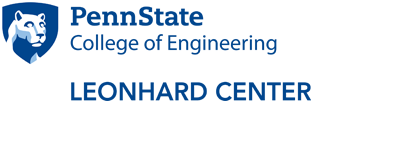2020 Funded Projects
Building and Measuring Inclusive Teams in Engineering
Scarlett Miller, Kathryn Jablokow, Sarah Ritter, Engineering Design, and Susan Mohammad, Psychology
The goal of this project is to develop new curricula and measurement methods to address the updated requirements from the Accreditation Board for Engineering and Technology (ABET) which require engineering institutions to educate and assess a student’s “ability to function effectively on a team whose members together provide leadership, create a collaborative and inclusive environment, establish goals, plan tasks, and meet objectives.” Specifically, this proposal focuses on the creation of collaborative and inclusive environments in our engineering classrooms.
Impact Scholar/Student Engagement
Matt Barone, Director, Undergraduate Student Engagement, and Lauren Griggs, Director, Multicultural Engineering Center
The goal of this project is to expand the current reach and impact of student engagement efforts with key student organizations and programs in the College of Engineering. The project will focus on the development of facilitated study groups FISE, MEP and Impact Scholars and in supporting the efforts of EUC and the Diversity Roundtable.
Problem-based Laboratory to Prepare Students for 21st Century Engineering Challenges
Siu Leung, Eric Marsh, Jean-Michel Mongeau, H.J. Sommer, Tak Sing Wong, Stephen Lynch, Dan Cortes, Brian Foley, Sean Brennan, Mechanical Engineering
The ultimate goal of our proposed work is to improve cognitive skills in our students, empower them to become independent learners and equip them to solve 21st-century global challenges. Our short-term goal is to develop an effective teaching model for upper-level engineering laboratory courses using problem-based approaches, focusing on complex system problems in a large classroom setting (100+ students).
Revitalizing Architectural Engineering’s First-year Seminar Through Core and Themed Modules
R.L. Solnosky, S. Atamturktur, N. Brown, M.K. Parfitt, M. Ling, Architectural Engineering
Poster »
The goal of the project is to establish a new responsive, replicable, and theoretically-informed approach for our First-Year Seminar offerings by: meet the goals put forth by the faculty senate for the First-Year Seminar experience in preparing students for university study, highlight architectural engineering career opportunities for future students, provide a consistent way students are introduced to architectural engineering as a field and develop a structured, yet customizable, learning modules can be developed and incorporated by architectural engineering faculty.
Development of Learning Modules for EDSIGN 100 to Develop World-class Engineers
Sven Bilén, Matt Parkinson, and Sarah Ritter, SEDTAPP
Poster »
The goal of this project was to provide students a consistent foundation across all sections of EDSGN100 through the development of six multidisciplinary modules. EDSGN 100 is the cornerstone design course for nearly 3600, primarily first-year, students at Penn State each year. In addition to reinforcing the breadth of the college and aligning with college objectives, these modules support updated course goals for EDSGN 100. Through a framework of World-Class Engineering, these modules reinforce the attributes of and assist our students in identifying as world-class engineers.
Re-designing EDSGN 100 Introductory Project to Promote World-class Engineering
Dorcas Kaweesa, Nicholar Meisel, Jessica Menold, Christopher McComb, and Sarah Ritter, SEDTAPP
Poster »
During this project, the team designed, implemented, and assessed a new, unifying design project that will run for the first 8 weeks of the EDSGN 100 semester and will offer a clear connection between the content from the modules and the successful execution of a world-class engineering design project. The team leveraged the range of expertise within SEDTAPP (already present in the modules), existing partnerships with faculty at the commonwealth campuses, and the growth of collaborative design software to provide our first-year students with a unique cornerstone design experience.
New Paradigm for Ph.D.-candidate Curriculum Based on Structured Learning Experiences
Cliff Lissenden, Francesco Costanzo, and Bruce Gluckman, Engineering Science and Mechanics
Poster »
Project Goals are to train incoming doctoral students to quickly become independent researchers; to provide graduate students with opportunities for structured self -directed learning; to introduce professional skill training into the Department of Engineering Science and Mechanics (ESM) doctorate curriculum; and to increase the number of doctoral applicants to ESM and, ultimately, the number of doctoral students in ESM.
Peer Advising Program: Engineering Peer Advising Leaders
Jennifer Saltsgiver and Jana Bontrager, Engineering Advising Center
Poster »
To develop a peer advising program that will advance the College of Engineering’s mission by offering technical and advising support to first- and second year students. The peer advisors will strive to promote academic excellence and student success by contributing to the intellectual and personal growth of students and by encouraging students to develop self-advocacy skills.
Limited Scope Projects
Integrating Law, Policy and Engineering: Digital Open Badges for Sustainability
Sandra Allain, Director, Law, Policy and Engineering Initiative
Esther Obonyo, Engineering Design and Architectural Engineering
Drawdown as a Unifying Theme in First Year Seminars to Promote Engagement and Retention
Rachel Brennan, Civil Engineering
Julio Urbina, Electrical Engineering
Redesigning How EDSGN 100 Students Learn and Practice 3D Modeling
Sarah Ritter and Elizabeth Starkey, Engineering Design
Exposing Student to Practical Design of Power Electronics Circuits to Gain Hands-on Experience
Arash Khoshkbar-Sadigh, Electrical Engineering
Improvement and Transition of IE 312 Flipped-format Labs to West 2 Laboratory Spaces
Robert Voigt, Industrial and Manufacturing Engineering


